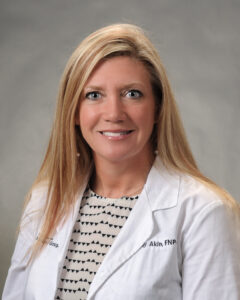Between taking care of the kids and maybe your parents, you have plenty of to-dos on your plate during your 40s. But along with taking care of a full list of responsibilities, this decade is also a time to pay attention to your heart health.
We often think of heart problems as affecting older adults. And while it’s true that problems such as heart attack and heart failure are more common among those in their 60s and beyond, they can and do occur in people of all ages.

More importantly, though—even if you don’t have any heart health issues now, you can take steps now that will benefit your heart later. Betsy Akin, a nurse practitioner with West Tennessee Medical Group Cardiology in Jackson, offers some insight.
What You Can Do in Your 40s to Protect Your Heart Health
The basics of good heart health are the same throughout life. Your heart and your overall health will benefit from healthy lifestyle habits.
Aren’t sure where to begin? Start here:
- Schedule a checkup. The first step toward better heart health is to understand how healthy your heart is now. An annual checkup can help you gauge that. During a checkup, your provider will order tests that keep an eye on your risk factors, including your blood pressure, your blood sugar, your weight and your cholesterol.
- Know your family medical history. Talk with your parents and other family members about any heart health issues they’ve faced. Knowing what conditions run in your family can arm you with info that’s helpful for your own heart health. Once you know your risk factors, you can work with a provider to determine a preventive strategy.
- Get moving. If you don’t already have an exercise routine, now’s a good time to make time for one! Experts recommend getting at least 150 minutes of moderate physical activity, like walking or jogging, each week. That breaks down to just more than 20 minutes per day. In addition to formal exercise, make it a goal to simply move more during your day, avoiding long stretches of sitting.
- Eat a healthy diet. Fill your plate with fruits and veggies, which are packed with heart-healthy antioxidants. Supplement meals with lean proteins, like chicken or fish, and whole grains. Because fatty fish such as salmon and tuna contain omega-3 fatty acids, which are particularly good for the heart, aim to eat two 4-ounce servings of them per week.
- Watch out for sodium and sugar. Most Americans get way more sodium and sugar in the foods they eat than is recommended. Carefully review nutrition labels with an eye on sodium and added sugar, and limit your intake of both. Flavor your foods with herbs and spices rather than salt.
- Moderate your alcohol intake. If you don’t drink, that’s totally fine. While there is some research indicating that a small amount of wine can boost your heart health, you can get the same effect from non-alcoholic sources, like grapes. If you do drink, limit yourself to two drinks per day if a man and one drink per day if a woman.
- Prioritize sleep. That’s hard to do in this stage of life, we know! But quality sleep is an essential component of optimal heart health. The Sleep Foundation recommends adults get between seven and nine hours of sleep each night. Consistently getting more or less than that can be hazardous to your health.
- Find healthy ways to manage stress. If you turn to ice cream or a cigarette after a tough day at the office, now’s the time to find better ways to handle your stress. While a small amount of stress is inevitable and can even be a positive for motivation, too much stress or stress that lingers puts strain on your heart. Look for healthy ways to manage stress, such as meditation, yoga, walking, long baths, or hobbies you enjoy.
- Just say no to smoking. If you smoke, it’s time to stop. Work with your provider to find a smoking cessation plan that fits your needs. If you don’t smoke, don’t start. Smoking is the single most preventable cause of death, and it’s a risk factor for nearly every serious health condition.
Could your heart use a checkup? Schedule and appointment with a West Tennessee Medical Group Cardiologist!
